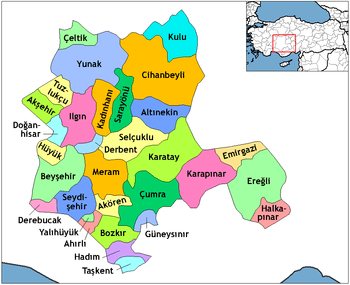Karatay, Konya
Karatay is a town and district of Konya Province in the Central Anatolia region of Turkey. Karatay is one of the central districts of Konya along with the districts of Meram and Selçuklu. According to 2000 census, population of the district is 214,589 of which 183,677 live in the urban center of Karatay.[3][4]
Karatay | |
|---|---|
District | |
 Mevlana Museum, Karatay, Konya | |
 Location of Karatay, Konya within Turkey. | |
 Karatay Location of Karatay, Konya within Turkey. | |
| Coordinates: 37°52′N 32°31′E | |
| Country | |
| Province | Konya |
| Government | |
| • Mayor | Mehmet Hançerli (AKP) |
| Area | |
| • District | 2,612.19 km2 (1,008.57 sq mi) |
| Elevation | 1,026 m (3,366 ft) |
| Population (2012)[2] | |
| • Urban | 256,455 |
| • District | 275,987 |
| • District density | 110/km2 (270/sq mi) |
| Time zone | UTC+2 (EET) |
| • Summer (DST) | UTC+3 (EEST) |
| Postal code | 42xxx |
| Area code(s) | 0332 |
| Licence plate | 42 |
| Website | www.konya.gov.tr |
The solar power plant Kızören in Konya which went online in 2016 covers an area of 430,000 m2 and will be able to produce 26 GWh of electricity annually.[5][6]
Places to see
- Mevlana Museum
- Aziziye Mosque
Twin cities
Notes
- "Area of regions (including lakes), km²". Regional Statistics Database. Turkish Statistical Institute. 2002. Retrieved 2013-03-05.
- "Population of province/district centers and towns/villages by districts - 2012". Address Based Population Registration System (ABPRS) Database. Turkish Statistical Institute. Retrieved 2013-02-27.
- Turkish Statistical Institute. "Census 2000, Key statistics for urban areas of Turkey" (in Turkish). Archived from the original (XLS) on 2007-09-27. Retrieved 2008-03-24.
- GeoHive. "Statistical information on Turkey's administrative units". Archived from the original on 2007-10-19. Retrieved 2008-03-24.
- Company opens Turkey’s ‘largest solar power plant’ in Central Anatolia
- Konya Karatay Kızören Güneş Enerji Santrali
gollark: Also, you live in Turkey, which has a kind of evil government, right? If Google cooperated with them, they could probably use that data to track down and/or identify dissidents.
gollark: I think they already use location data to "help" investigate crimes, in ways which tend to implicate innocent people randomly.
gollark: Giving one company access to people's accurate location history, conversations, emails and whatnot could probably lead to problems.
gollark: Presumably, somewhat creepy overtargeted advertising, spread it further (which I don't really like in itself), probably (if I was weird and still used Google stuff on my phone) listen into my conversations.
gollark: Thing is, what I'm attempting to say is: what sort of bad things do you think people or companies could do with leaked or bought or whatever data?
References
- Falling Rain Genomics, Inc. "Geographical information on Konya, Turkey". Retrieved 2008-03-24.
External links
- District governor's official website (in Turkish)
- District municipality's official website (in Turkish)
This article is issued from Wikipedia. The text is licensed under Creative Commons - Attribution - Sharealike. Additional terms may apply for the media files.